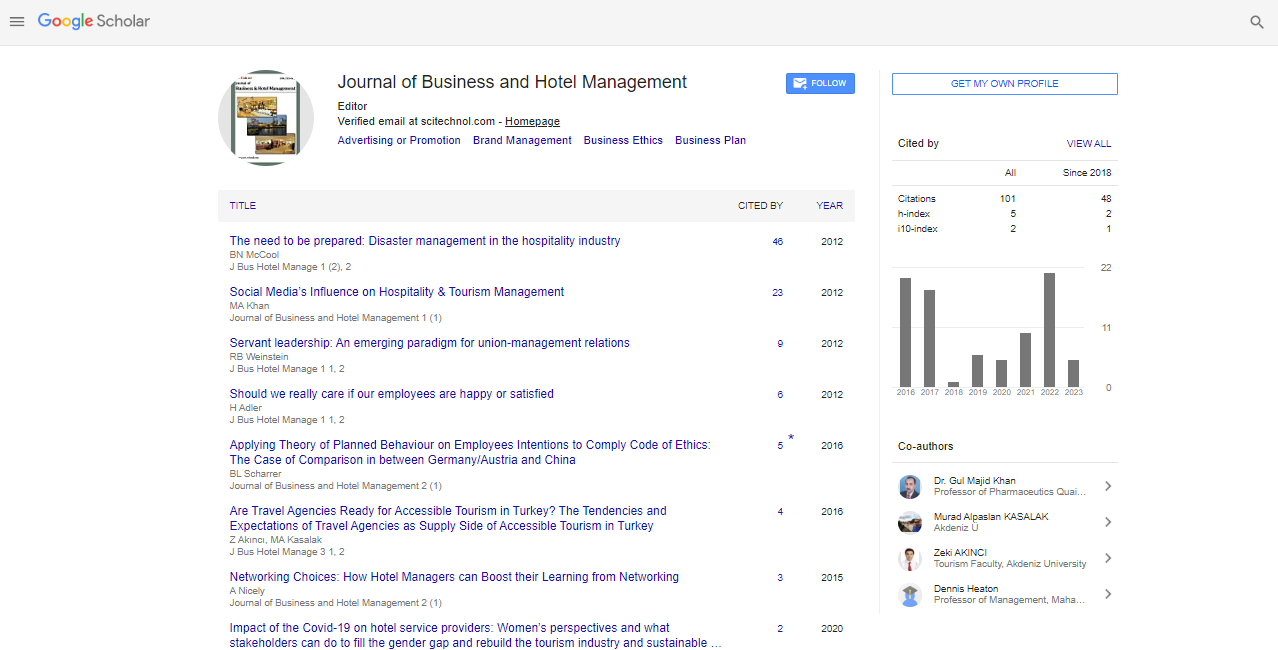Short Communication, Jbhm Vol: 7 Issue: 3
Understanding Consumer Behavior in Hotel Management: A Key to Guest Satisfaction
Cranage Annmarie*
Department of Hotel Management, University of Houston, 4450 University Drive, Houston, USA
*Corresponding Author: Cranage Annmarie
Department of Hotel Management,
University of Houston, 4450 University Drive, Houston, USA
E-mail: Annmarie76@gmail.com
Received date: 28 August, 2023, Manuscript No. JBHM-23-117773;
Editor assigned date: 30 August, 2023, PreQC No. JBHM-23-117773 (PQ);
Reviewed date: 13 September, 2023, QC No. JBHM-23-117773;
Revised date: 21 September, 2023, Manuscript No. JBHM-23-117773 (R);
Published date: 29 September, 2023, DOI: 10.4172/2324-9129.1000146
Citation: Annmarie C (2023) Understanding Consumer Behavior in Hotel Management: A Key to Guest Satisfaction. JBHM 9:3.
Description
In the realm of hotel management, understanding consumer behavior is akin to holding the master key to guest satisfaction. Every action, every decision made by hoteliers, is influenced by the intricate patterns of consumer behavior. From booking preferences to on-site experiences, comprehending the psychology behind guest choices is important for creating memorable stays. This essay delves into the multifaceted aspects of consumer behavior in hotel management, exploring how hotels analyze, interpret, and respond to the needs and desires of their guests [1].
The decision-making process
Consumer behavior in hotel management begins long before a guest checks in. Potential guests go through a decision-making process that involves problem recognition, information search, evaluation of alternatives, and ultimately, the booking decision. Understanding this process is essential for hotels to effectively market their offerings. Online presence, user-friendly booking platforms, and positive reviews play a pivotal role during this phase. Hotels that optimize their websites for ease of use, provide detailed information, and showcase positive guest experiences create a favorable first impression, influencing the initial decision-making stage [2].
Emotional connections and brand loyalty
Guests often form emotional connections with hotels, driven by their experiences, interactions with staff, and the overall ambiance. A warm welcome, personalized service, and attention to detail evoke positive emotions, fostering a sense of belonging. Hotels that prioritize creating these emotional connections cultivate brand loyalty. Repeat guests become brand advocates, sharing their positive experiences with others. Therefore, hotels invest in staff training programs that emphasize empathy, effective communication, and a genuine desire to exceed guest expectations [3].
Cultural sensitivity and personalization
Consumer behavior in the context of hotel management is significantly influenced by cultural differences. Guests from diverse backgrounds have varied preferences and expectations. Successful hotels recognize this diversity and tailor their services to accommodate different cultural norms. Personalization is a key strategy; hotels collect data on guest preferences, such as room temperature, pillow types, and dietary restrictions, to provide customized experiences. By anticipating and meeting individual needs, hotels enhance guest satisfaction and ensure a memorable stay, irrespective of cultural differences [4,5].
Online reviews and social influence
In the digital age, online reviews and social media profoundly impact consumer behavior in hotel management. Potential guests often rely on reviews and recommendations from previous visitors when making booking decisions. Positive reviews build trust, enhance credibility, and attract new guests. Conversely, negative reviews can deter potential visitors. Hotels actively monitor online feedback, responding promptly to guest reviews. Such engagement demonstrates responsiveness and a commitment to guest satisfaction, influencing the decisions of prospective guests who read these reviews [6,7].
The role of technology
Technology plays a transformative role in understanding and responding to consumer behavior. Hotels employ data analytics to analyze guest preferences and behavior patterns. This data-driven approach allows hotels to make informed decisions, such as optimizing room rates, offering personalized packages, and refining service offerings [8]. Additionally, mobile apps and in-room technology enhance guest experiences. Mobile check-in, room controls via apps, and personalized recommendations based on guest preferences are examples of how technology caters to the evolving needs of guests, shaping their behavior and expectations [9,10].
Conclusion
In the intricate tapestry of hotel management, consumer behavior forms the vibrant threads that weave the guest experience. From the initial decision-making process to emotional connections, cultural sensitivity, social influence, and the role of technology, every aspect of consumer behavior is carefully considered. Hotels that truly understand their guests, empathize with their needs, and proactively adapt to their expectations emerge as industry leaders. By recognizing the power of consumer behavior, hotels not only meet guest demands but also exceed them, creating exceptional, unforgettable experiences that transform one-time visitors into loyal patrons. As the hospitality landscape continues to evolve, the ability to comprehend and respond to consumer behavior remains the cornerstone of successful hotel management, ensuring that every guest encounter is not just a stay but a cherished memory.
References
- Bettis RA, Hitt MA (1995) The new competitive landscape. J Strateg Manag 16: 7-19.
- Lai CS, Chiu CJ, Yang CF (2010) The effects of corporate social responsibility on brand performance: The mediating effect of industrial brand equity and corporate reputation. J Bus Ethics 95: 457-469.
- Srivastava M, Kamdar RM (2009) Brand image formation as a function of involvement and familiarity. Paradigm 13: 84-90.
- Aaker DA (1992) The value of brand equity. J Bus Strategy 13: 27-32.
- Sen S, Du S, Bhattacharya CB (2016) Corporate social responsibility: A consumer psychology perspective. Curr Opin Psychol 10: 70-75.
- Urde M, Koch C (2014) Market and brand-oriented schools of positioning. J Prod Brand Manag 23: 478-490.
- Kuenzel S, Halliday SV (2008) Investigating antecedents and consequences of brand identification. J Prod Brand Manag 17: 293-304.
- Nunan D, Domenico DM (2013) Market research and the ethics of big data. Int J Mark Res 55: 505-520.
- Ha HY, Perks H (2005) Effects of consumer perceptions of brand experience on the web: Brand familiarity, satisfaction and brand trust. J Consum Behav 4: 438-452.
- Luisa M, Mariangela F, Pierluigi NI (2004) Market research for requirements analysis using linguistic tools. Requirements Eng 9: 40-56.
 Spanish
Spanish  Chinese
Chinese  Russian
Russian  German
German  French
French  Japanese
Japanese  Portuguese
Portuguese  Hindi
Hindi 